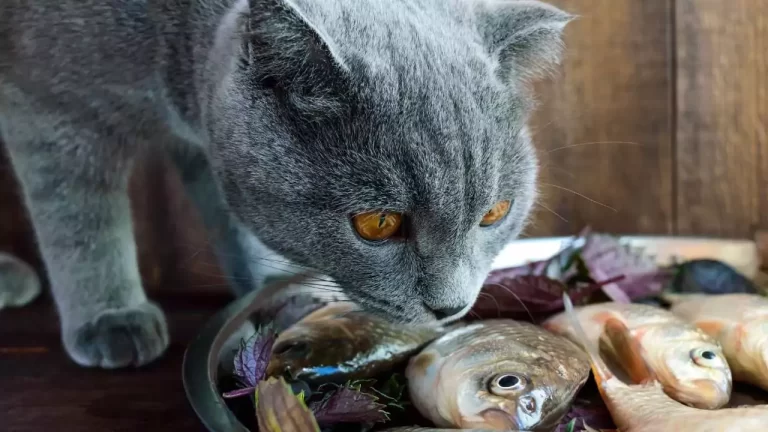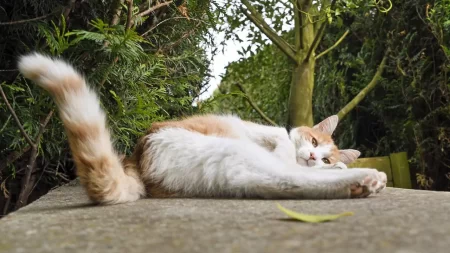Cats may have breath that smells like fish due to their diet. If they consume fish-based cat food or treats, it can leave a lingering fishy odor on their breath, especially with canned or wet food.
Additionally, bad breath in cats can result from mouth ulcers, sores, or even cancer. Regular brushing of a cat’s teeth, ideally every day, using tooth gel for felines, can help prevent most cases of bad breath.
Linking brushing to a treat, such as drinking water from a dripping faucet or a favorite canned food, is recommended by veterinarians.
Common Causes of Bad Breath in Cats
There are many possible reasons why your cat’s breath smells like fish, but here are some of the most common ones:
- Excessive bacteria in the mouth: Cats naturally have some bacteria in their mouth, but when they accumulate too much, they can cause bad breath. This can happen if your cat eats fishy food, has poor oral hygiene, or has a dry mouth.
- Dental health problems: One of the most common causes of bad breath in cats is dental disease, such as gingivitis, periodontitis, tooth decay, or abscesses. These conditions can cause inflammation, infection, and pain in your cat’s mouth, as well as foul-smelling breath.
- Gut and airway infections: Sometimes, the source of bad breath in cats is not the mouth, but the digestive or respiratory system. If your cat has an infection in their stomach, intestines, or lungs, they may have a fishy odor in their breath. This can be caused by bacteria, viruses, parasites, or foreign objects.
- Lymphocytic plasmacytic stomatitis: This is a rare but serious condition that affects the immune system of cats. It causes severe inflammation and ulceration of the mouth, gums, and throat, leading to bad breath, drooling, bleeding, and difficulty eating. The exact cause of this condition is unknown, but it may be related to feline leukemia virus (FeLV) or feline immunodeficiency virus (FIV).
- Oral cancers: Another rare but serious cause of bad breath in cats is oral cancer, such as squamous cell carcinoma, melanoma, or fibrosarcoma. These cancers can grow in the mouth, tongue, or throat, and cause bad breath, bleeding, swelling, and pain. They can also spread to other parts of the body, such as the lymph nodes, lungs, or bones.
- Kidney and liver disease: The kidneys and liver are vital organs that filter and detoxify the blood. If they are not functioning properly, they can cause a buildup of toxins and waste products in the blood, which can affect the breath. Some of the signs of kidney and liver disease in cats are bad breath, weight loss, vomiting, diarrhea, increased thirst and urination, and jaundice.
How to Treat and Prevent Bad Breath in Cats?
Depending on the cause of bad breath in cats, there are different ways to treat and prevent it. Here are some of the general tips:
- Professional dental cleaning: The best way to treat and prevent dental problems in cats is to have their teeth cleaned by a veterinarian at least once a year. This will remove any plaque, tartar, and bacteria that cause bad breath and dental disease. The vet may also perform dental x-rays, extractions, or other procedures if needed.
- Proper diet and nutrition: Feeding your cat a balanced and high-quality diet can help maintain their oral and overall health. You can also choose a diet that is specially formulated for dental health, such as dry kibble that helps scrape off plaque, or wet food that helps hydrate the mouth. Avoid feeding your cat fishy or smelly food, as this can contribute to bad breath.
- Cat chews for oral hygiene: Another way to help your cat keep their teeth clean and fresh is to provide them with cat chews that are designed for oral hygiene. These are treats that have a crunchy texture, a pleasant flavor, and ingredients that help reduce plaque and bacteria. You can give your cat one or two chews per day, depending on their size and preference.
- Gels and water additives: You can also use gels and water additives that are made for cats to improve their breath. These are products that you can apply to your cat’s teeth and gums, or add to their drinking water, that help kill bacteria and freshen the breath. You can find these products at pet stores or online, but make sure they are safe and effective for cats.
- Regular oral exams at the vet: Lastly, you should take your cat to the vet for regular oral exams, at least once or twice a year. This will help detect any signs of dental disease, infection, or cancer, and provide early treatment if needed. The vet will also advise you on the best oral care routine for your cat, based on their age, breed, and health condition.
When to Contact the Vet
If your cat’s breath smells like fish, you should not ignore it or assume it is normal. Bad breath can be a symptom of a serious health problem that needs medical attention. You should contact the vet if:
- Your cat’s bad breath persists despite home remedies
- Your cat has other symptoms, such as drooling, bleeding, swelling, or pain in the mouth
- You are concerned about an underlying medical condition, such as kidney or liver disease, or oral cancer
The vet will examine your cat’s mouth and perform tests, such as blood work, urine analysis, or biopsy, to determine the cause of bad breath and provide appropriate treatment. The sooner you seek help, the better the outcome for your cat.
Bad breath in cats is not something to take lightly. It can indicate a health problem that needs to be addressed. By following the tips in this article, you can help your cat have a healthy and fresh-smelling mouth. Remember, your cat’s breath is a reflection of their well-being.







